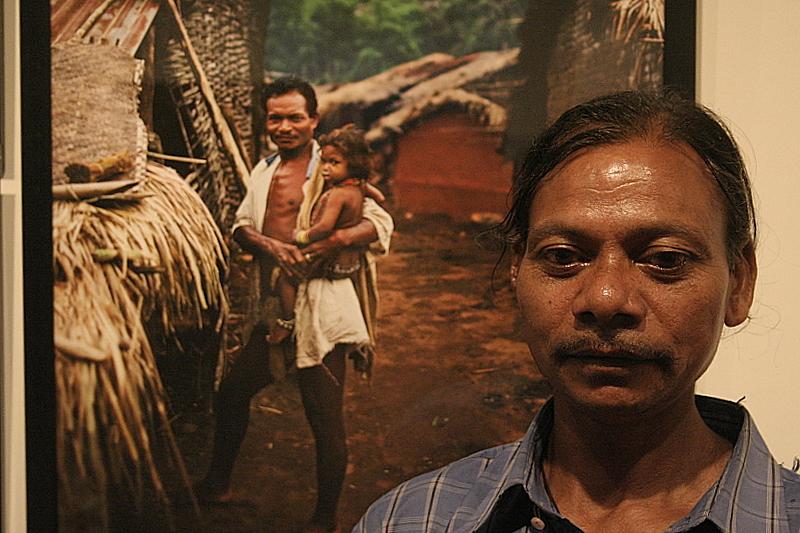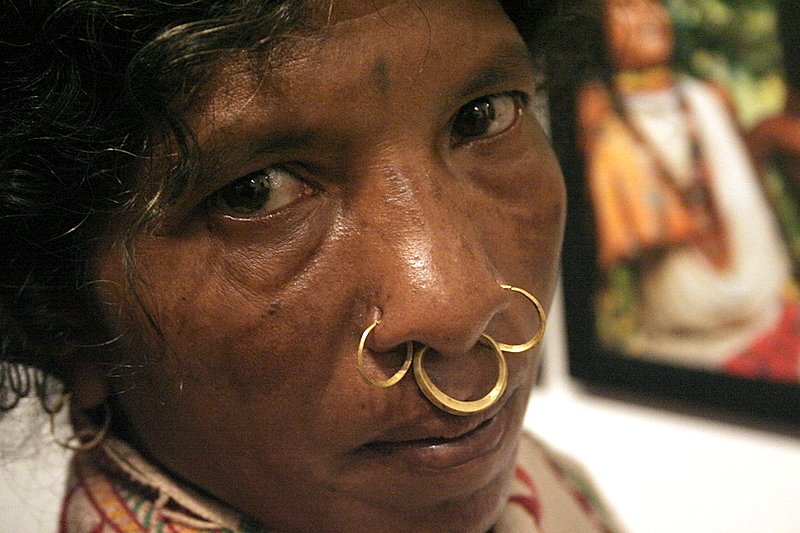Dangaria Kandha on:
[Wikipedia]
[Google]
[Amazon]
The Dangaria Kandha people are members of the Kondhs. They are located in the



Niyamgiri
The Niyamgiri is a hill range situated in the districts of Kalahandi and Rayagada in the south-west of Odisha, India. These hills are home to Dongria Kondh indigenous people. The hills have one of India's most pristine forests in the interio ...
hills in the state of Odisha
Odisha (English: , ), formerly Orissa ( the official name until 2011), is an Indian state located in Eastern India. It is the 8th largest state by area, and the 11th largest by population. The state has the third largest population of ...
(formerly Orissa) in India. They sustain themselves from the resources of the Niyamgiri forests, practising horticulture and shifting cultivation. They have been at the centre of a dispute over mining rights in the area.
Topography
Niyamgiri is a hill range spread over 250 km2 which falls under theRayagada
Rayagada is a municipality in Rayagada district in the Indian state of Odisha. It is the administrative headquarters of Rayagada district.
History
The city of Rayagada was founded by King Vishwanath Dev Gajapati (1527-1531 CE) of the Suryavan ...
and Kalahandi
Kalahandi (locally pronounced ''Kalahani'') is a district of Odisha in India. Archaeological evidence of Stone Age and Iron Age human settlement has been recovered from the region. Asurgarh offered an advanced, well civilised, cultured and ur ...
District in south-west Odisha, India.Tatpati, M., Kothari, A., & Mishra, R. (2016). The Niyamgiri Story: Challenging the Idea of Growth without Limits? Pune, Maharashtra: Kalpavriksh. It is an area containing densely forested hills, deep gorges and cascading streams. Its highest point is the mountain known as Niyamgiri or Niyam Dongar, at a height of 1,306m.

Society
The Dongria Kondh community numbers approximately 8,000 people, inhabiting about 100 villages. The social structure among the community is adapted to the surroundings of Niyamgiri forested hill country, where they have lived for many generations.Nomenclature
The Dongria Kondh derive their name from ''dongar'', meaning ‘agricultural land on hill slopes’, and the name for themselves is Jharnia"protector of streams".Language
The people of Niyamgiri use Kui language. Kui language is not written, but it is spoken among the people of Kondh community.Beliefs
The Dangaria Kandha worship Niyam Raja (Niyamraja), the supreme god of the Niyamgiri jungle, believing that Niyam Raja is the source of their essential resources. The deep reverence and respect that the Dongria have for their gods, hills and streams pervade every aspect of their lives. Even their art reflects the mountains, in the triangular designs found on village shrines to the many gods of the village, farm and forests and their leader, Niyam Raja.

Division of clan
The traditional Dongria Kondh society has always been based on a tightened family structure involving people from different generations and these were marked by geographically demarcated clans where each clan was identified by a male animal name. The identification of clan is further classified by surname basis where the surname of the eldest male member of the most powerful family of the clan is generally used to denote that particular clan. This system of classification of clans within the Dongria Kondh community is a process of clan division which is also similar to Native American society where there was a presence of dispersed clan distribution throughout the land. According toanthropologist
An anthropologist is a person engaged in the practice of anthropology. Anthropology is the study of aspects of humans within past and present societies. Social anthropology, cultural anthropology and philosophical anthropology study the norms and ...
Robert H. Winthrop, these type of clan is formed without any kind of hierarchy where a complete egalitarian system is created by crosscutting any kind of social affiliation. This culture of clan division is undoubtedly an integrated system and primarily has its allegiance with the “''Kondh Pradhan''". The Kondh community in the Niyamgiri hills is organized into many clans from which thirty-six clans are clearly identifiable where each clan possess their own customary territories which is locally also known as ''padars'' (consisting several hills). The Dongria Kondh people have more than 300 settlements or hamlets within their clan territory which is also not a permanent establishment rather these communities abandon the other communities in search of new ones within their own habitat region. The reason behind abandoning their houses can be because of practising of slash and burn agriculture also locally known as ''podu'' in which they leave one piece of land and move to another for further agricultural purposes.
Social customs and political structure
The socio-political governing and decision-making body of the Dongria Kondh community is also known as the ''Kutumba''. To make the work of the then divided into two groups one which functions at the level of clan or ''Kuda'' ''Kutumba'' and one at the level of settlement or ''Nayu'' ''Kutumba''. The management of each clan is then done according to a more root level division, in which a separate group of people are dedicated to address the religious and political matters of the Dongria Kondh hence four functional groups or ''punjas'' are formed. The ''punjas'' of the Dongria Kondhs are ''jani'', ''pujari'', ''bismajhi'' and ''mandal''. The ''kuda'' kutumba presides over the ''matha'' ''mandal'' which manages the affairs of a particular clan in a cluster of villages. It presides and solves disputes related to inter-ethnic and inter-religious groups. The Dongria Kondh have adopted a system of imparting cultural and traditional values to the adolescents and youths in their villages through exclusive youth dormitories. The Dongria women are also given equal status in the society in matters such as widow remarriage, possessing property without the interference of their husbands and sons.Marriage customs
The Dongria Kondh family structure depends on which clan the person belongs to as clan exogamy is practised in this community which according to some people is a process of incest taboo prevalent among these communities in its customs. These exogamous clan group have resulted in existence of dominant clan groups which was due to a process of marriage and kinship which formed during a long period of time.Mining dispute
In 1997Sterlite Industries
Sterlite Copper is a subsidiary of Sterlite industries, a company owned by Vedanta Limited.
History
It was originally incorporated as Rainbow Investments in 1975, the name of the company was changed to Sterlite Cables in 1976. It was later r ...
, a part of the Vedanta Resources
Vedanta Resources Limited is an Indian diversified mining company headquartered in London, United Kingdom. It is the largest mining and non-ferrous metals company in India and has mining operations in Australia and Zambia and oil and gas opera ...
group, put forward proposals to construct an aluminium refinery at the nearby location of Lanjigarh
Lanjigarh is a town in Lanjigarh Tehsil in Kalahandi district in Odisha State. Lanjigarh is 58 km away from Bhawanipatna and 430 km from Bhubaneswar
Bhubaneswar (; ) is the capital and largest city of the Indian state of Odisha. The ...
and to extract bauxite
Bauxite is a sedimentary rock with a relatively high aluminium content. It is the world's main source of aluminium and gallium. Bauxite consists mostly of the aluminium minerals gibbsite (Al(OH)3), boehmite (γ-AlO(OH)) and diaspore (α-AlO(O ...
from the Niyamgiri Hills as feedstock for the refinery, as a joint venture with the state-owned Orissa Mining Corporation. The refinery opened in 2006, but the mining development was held up by legal action, and it was found that the construction of the refinery had broken laws relating to environmental protection and local people's rights. The company argued that mining on Niyamgiri should proceed, as it would enable aluminium to be produced more economically than bringing in raw materials from greater distances. There was considerable opposition among the Dongria Kondh, and campaigners against the scheme, including the Wildlife Institute of India
The Wildlife Institute of India (WII) is an autonomous natural resource service institution established in 1982 under the Ministry of Environment Forest and Climate change, Government of India.
WII carries out wildlife research in areas of stu ...
, maintained that it would cause damage to the environment and disrupt the way of life of the local people. The company repudiated the environmental claims and said that it was improving the local economy and providing new facilities. The campaign against the mining proposals gathered support from Survival International
Survival International is a human rights organisation formed in 1969, a London based charity that campaigns for the rights of indigenous and/or tribal peoples and uncontacted peoples.
The organisation's campaigns generally focus on tribal peopl ...
and individuals including Arundhati Roy
Suzanna Arundhati Roy (born 24 November 1961) is an Indian author best known for her novel ''The God of Small Things'' (1997), which won the Booker Prize for Fiction in 1997 and became the best-selling book by a non-expatriate Indian author. S ...
, Michael Palin
Sir Michael Edward Palin (; born 5 May 1943) is an English actor, comedian, writer, television presenter, and public speaker. He was a member of the Monty Python comedy group. Since 1980, he has made a number of travel documentaries.
Palin w ...
, Bianca Jagger
Bianca Jagger (born Blanca Pérez-Mora Macías; 2 May 1945)
and Joanna Lumley
Dame Joanna Lamond Lumley (born 1 May 1946) is an English actress, presenter, former model, author, television producer, and activist. She has won two BAFTA TV Awards for her role as Patsy Stone in the BBC sitcom ''Absolutely Fabulous'' (1992 ...
.
The mining development was placed on hold by the Government of India in 2010, with a statement that the company had flouted the law and disregarded the rights of the Dongria Kondh. In 2013 the Supreme Court of India
The Supreme Court of India ( IAST: ) is the supreme judicial authority of India and is the highest court of the Republic of India under the constitution. It is the most senior constitutional court, has the final decision in all legal matters ...
ordered the Odisha Government to consult the local tribespeople, citing the protection afforded to the rights of tribal and forest groups under the Forest Rights Act
The Scheduled Tribes and Other Traditional Forest Dwellers (Recognition of Forest Rights) Act, 2006, is a key piece of forest legislation passed in India on 18 December 2006. It has also been called the Forest Rights Act, the Tribal Rights Act ...
2006. Twelve Dongria Kondh village councils were consulted and all rejected the mining proposals. In January 2014 the Indian Ministry of Environment, Forest and Climate Change
The Ministry of Environment, Forest and Climate Change (MoEFCC) is an Indian government ministry. This ministry is headed by Secretary Rank senior most IAS officer. The ministry portfolio is currently held by Bhupender Yadav, Union Minister of ...
announced that it was refusing clearance for the mine. The state government of Odisha has since unsuccessfully sought permission from the Supreme Court to restart the scheme.
In fiction
In 2010 Survival International placed an advertisement in ''Variety
Variety may refer to:
Arts and entertainment Entertainment formats
* Variety (radio)
* Variety show, in theater and television
Films
* ''Variety'' (1925 film), a German silent film directed by Ewald Andre Dupont
* ''Variety'' (1935 film), ...
'' magazine drawing attention to similarities between the scenario of James Cameron
James Francis Cameron (born August 16, 1954) is a Canadian filmmaker. A major figure in the post-New Hollywood era, he is considered one of the industry's most innovative filmmakers, regularly pushing the boundaries of cinematic capability w ...
's film ''Avatar
Avatar (, ; ), is a concept within Hinduism that in Sanskrit literally means "descent". It signifies the material appearance or incarnation of a powerful deity, goddess or spirit on Earth. The relative verb to "alight, to make one's appearanc ...
'' and the situation of the Dongria Kondh.
See also
* Orissa Mining Corporation v. Ministry of Environment & Forest & OthersReferences